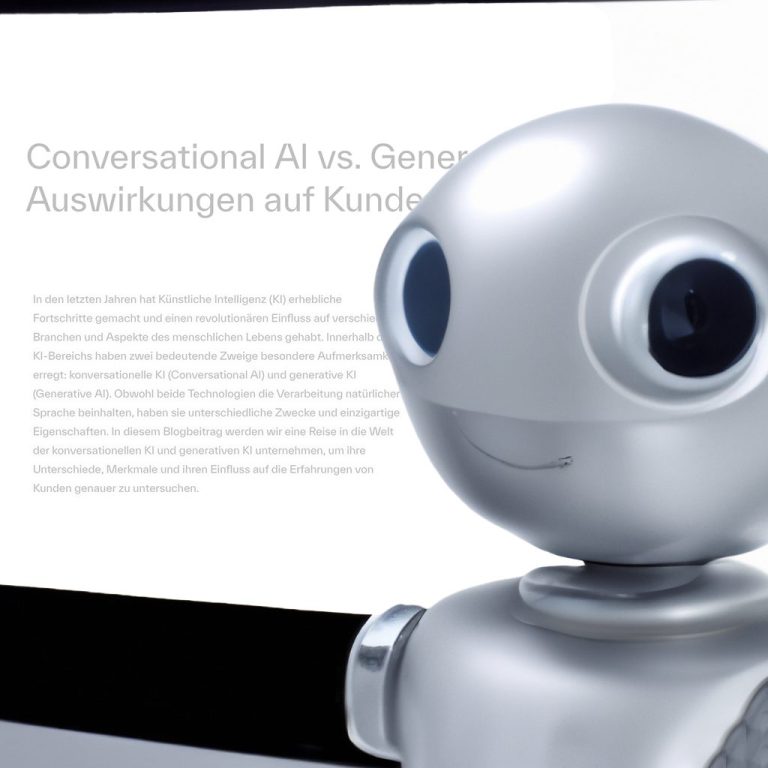ChatGPT vs. traditional customer service
How artificial intelligence is redefining traditional customer service
In the business world, excellent customer service has become indispensable. Customer service representatives are a company’s ambassadors on the front line. They deal with customer concerns, questions and feedback. Traditionally, customer service has relied on person-to-person interactions in the form of phone calls, emails and face-to-face support. The integration of ChatGPT, an AI-driven conversational agent, has proven to be a promising alternative.
We examine the merits of traditional customer service methods and ChatGPT integration. We focus on the efficiency, cost benefits and customer satisfaction of both approaches. We highlight the practical insights associated with these methods and provide customer service agents with valuable knowledge to make informed decisions.

Almost 60% of customers find long queues and waiting times the most frustrating part of the service experience. 68% of customers are annoyed when their call is transferred between departments.
Section 1: Traditional customer service methods
Traditional customer service methods are the foundation of customer support and include various channels such as telephone support, email assistance and face-to-face interactions. With their direct and personal approach, they have proven successful in building customer relationships.
Scripted responses ensure consistency in communication. Manual ticketing systems enable efficient issue tracking and prioritization. Established escalation protocols ensure that complex issues are dealt with appropriately.
Section 2: ChatGPT integration in customer service
ChatGPT, developed by OpenAI, represents a turning point in customer service. This AI-powered conversational agent conducts conversations in natural language and provides quick responses to customer queries. By integrating ChatGPT, companies offer immediate and consistent support, regardless of the volume of requests.
ChatGPT integration
Implementing ChatGPT integration requires selecting a suitable model and fine-tuning it to specific industry requirements. It can be deployed on websites, messaging platforms or mobile applications. Regular monitoring and updates ensure optimal performance.
Approaches and techniques
The ChatGPT integration offers different approaches. Fully automated responses process routine requests independently. The hybrid support of chatbot and human AI combined with human agents provides precise and efficient answers. Sentiment analysis tools measure customer satisfaction and sentiment.
Section 3: Comparative analysis
Efficiency and response time
Due to new technologies and digitally oriented customers, the volume of customer interactions is so high that it is impossible for call center agents to handle them in a short time.
Studies show that ChatGPT integration significantly reduces response time compared to traditional methods. The AI can handle multiple requests simultaneously. Waiting times for customers seeking support are reduced and agent capacity is increased by up to 80%.
Cost efficiency
Traditional customer service requires a large number of employees to handle different requests. The ChatGPT integration offers cost efficiency by automating routine tasks. Companies can utilize their human resources more efficiently. After implementing the ChatGPT integration, they report significant cost savings.
Customer satisfaction
Customer feedback shows that ChatGPT’s fast and accurate responses are appreciated. For complex issues, some customers still prefer human interaction. The balance between automated and human support is critical to maintaining high customer satisfaction.
Contact center automation can improve customer satisfaction by up to 50% through faster and more accurate responses and processes.
Section 4: Good to know
Dealing with privacy and security concerns
Privacy and security are of paramount importance with the ChatGPT integration. It is important to ensure that customer data is handled securely and in accordance with data protection regulations. OpenAI’s integration with Azure complies with all EU data protection directives, giving both companies and customers peace of mind.
Training and implementation
Proper training of customer service representatives is essential for a successful ChatGPT integration. Training should recognize when human intervention is required and include continuous improvement of AI performance.



